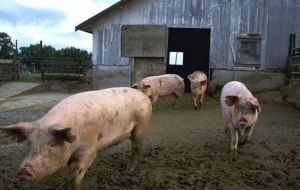MercoPress. South Atlantic News Agency
New mix of hogs and seasonal flu detected in Canadian farm
 The hogs H3N2 virus has been around for over a decade
The hogs H3N2 virus has been around for over a decade Two farm workers in Western Canada have become infected with a new flu virus, health officials said this week, emphasizing the strain, described as non-pandemic influenza A virus, was not related to the H1N1 pandemic.
The two workers, both employees at a hog barn operation in the province of Saskatchewan, have fully recovered. A third case is under investigation.
“Ongoing H1N1 surveillance in Saskatchewan detected this virus and we will continue to aggressively monitor and test Saskatchewan residents in the affected areas” stated Dr. Moira McKinnon, Saskatchewan's chief medical health officer.
The new virus contains genes from a seasonal human H1N1 flu strain and a flu virus common in the swine population called triple reassortant H3N2, said Dr. Greg Douglas, Saskatchewan's chief veterinary officer.
The virus is not connected to the H1N1 strain, sometimes referred to as swine flu that has killed more than 400 people worldwide. The strain is believed to have begun in Mexico and has been labelled a pandemic by the World Health Organization.
There are no signs of increased illness in the hog herd, Douglas added.
“This is a human health issue,” he said. “Saskatchewan pork continues to be safe ... This is not a food safety issue at all.”
Concern about the issue of pigs becoming infected with the H1N1 flu has been heightened in Canada since a herd in Alberta became infected in April. A human worker who had visited Mexico was initially suspected as the source but was later ruled out.
The Saskatchewan farm is not under quarantine, but the owner has agreed not to move the pigs, said Dr. Frank Plummer, chief science adviser for the Public Health Agency of Canada
The virus would likely not have been detected at all if not for heightened influenza testing as a result of the pandemic, Plummer said.
“Any time there's a new influenza A strain, we have to be concerned about it, but these events occur and are almost always dead ends,” he said.
All workers on the hog farm are being vaccinated. Douglas said he expects the hogs will eventually go to slaughter as they normally would.
The workers have been in Saskatchewan for about one year and had not recently travelled, said Dr. Moira McKinnon.
Plummer said the new virus was likely transmitted from the pigs to the workers, but said the source of transmission of the pandemic H1N1 virus on the Alberta hog farm, which was quarantined in April, was probably human.




Top Comments
Disclaimer & comment rulesCommenting for this story is now closed.
If you have a Facebook account, become a fan and comment on our Facebook Page!